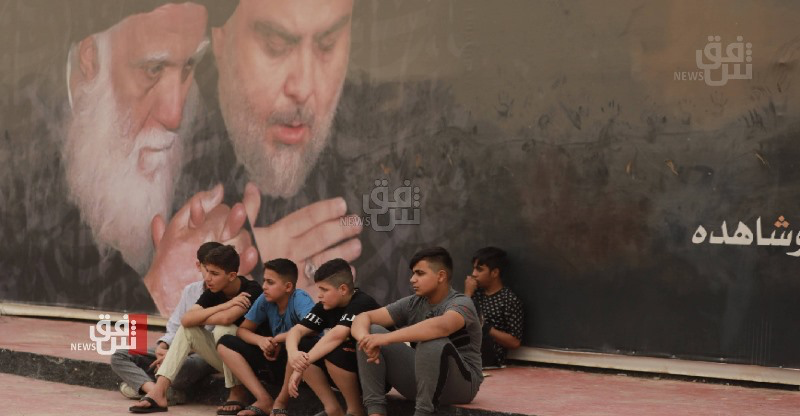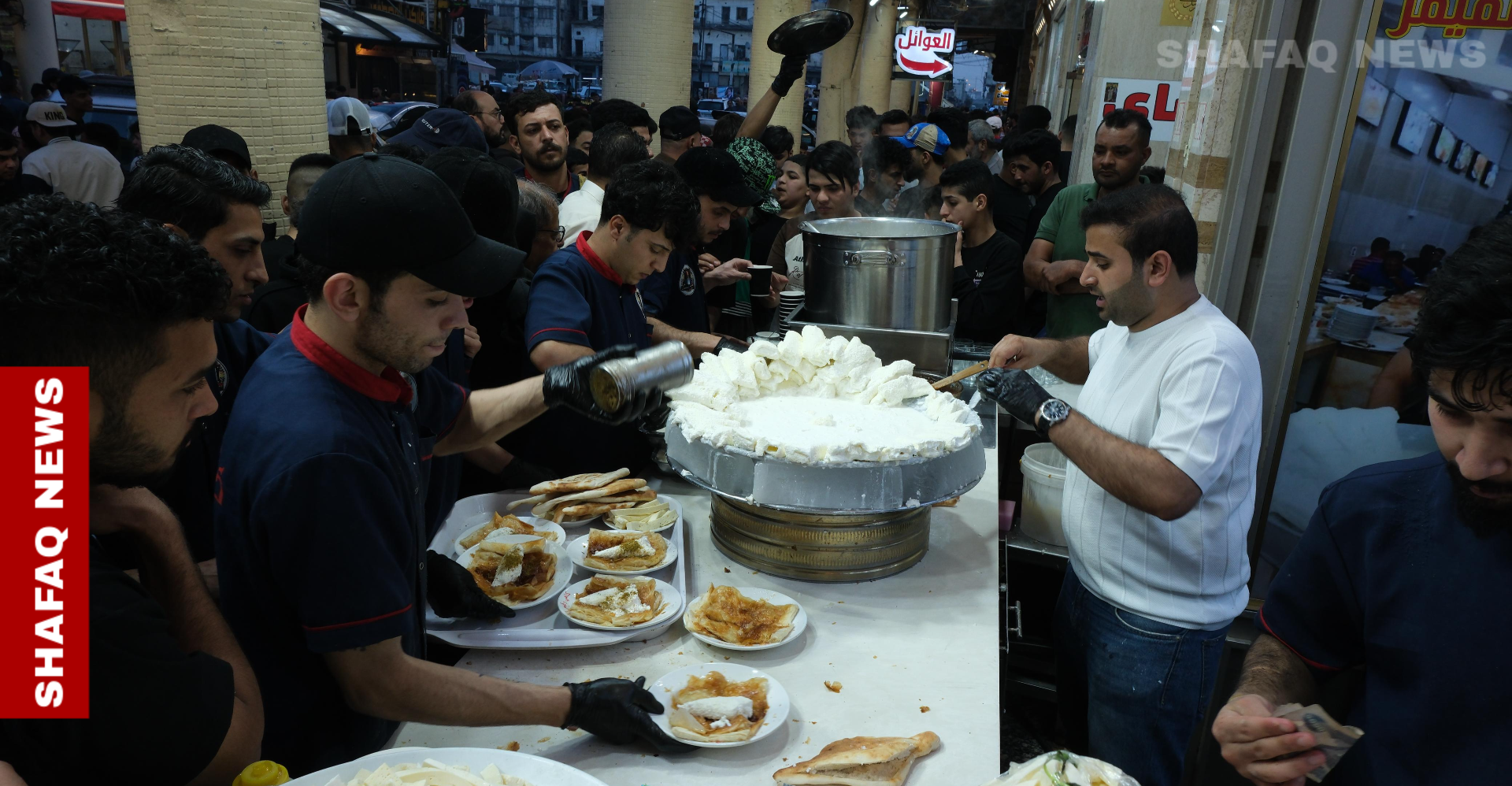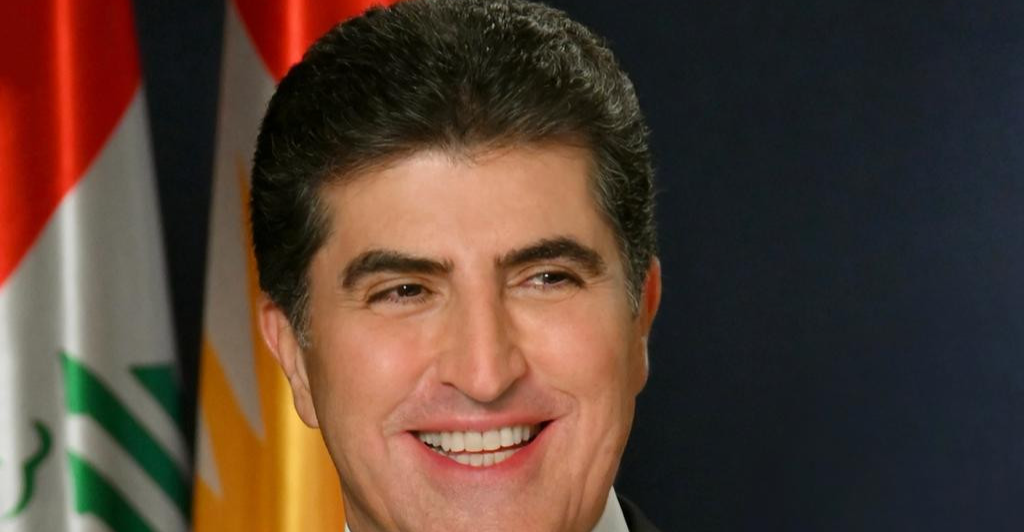Iraq Elections: Al-Sadr's Move, Coordination Framework's gamble, and new forces

Shafaq News/ On Thursday, Muqtadaal-Sadr’s announcement to steer clear of the upcoming elections sent shockwavesthrough Iraq’s political landscape, reigniting calls to purge the politicalsystem of corrupt figures and money launderers. As tensions mount, a new waveof civil forces is emerging, signaling a potential shift in the nation’sleadership and a fierce battle for the next government’s formation.
The 2021 Iraqi parliamentaryelections, conducted under a new electoral law designed to reduce the influenceof entrenched political elites, revealed growing divisions among Shiitefactions and shifted Iraq’s political power dynamics.
Muqtada al-Sadr's Movement emergedas the biggest winner, securing 73 out of the 329 seats in Iraq's Parliament.This victory reinforced his position as a major political force, surpassinglong-standing Shiite parties such as Nouri al-Maliki's State of Law Coalition.Al-Sadr’s populist appeal and anti-corruption message resonated especially withIraq’s youth, many of whom felt disenfranchised by the political establishment.
Political fragmentation deepened in2022 when Muqtada al-Sadr ordered his 73 MPs to resign in protest againstpolitical gridlock and corruption. His withdrawal allowed the CoordinationFramework to take control of government formation and provided an opportunityfor Prime Minister Mohammed Shia al-Sudani to consolidate power.
Now, with elections looming inOctober, political maneuvering is escalating. Muqtada al-Sadr’s potentialreturn to politics is seen as a pivotal factor.
Rahman al-Jazaeri, a senior figurein the Coordination Framework, indicated that an official announcement on thereturn of al-Sadr's Patriotic Shiite Movement is expected after Ramadan."If al-Sadr re-enters the race, he will undoubtedly be a major contender,"he confirmed.
Al-Sadr’s possible comeback hasalready drawn responses from political rivals. In February, his movementsharply responded to comments by Nouri al-Maliki, who stated that theCoordination Framework would remain a dominant force in the next government, whetheror not the Sadrists returned to the political arena.
A senior Sadrist figure dismissedany notion of collaboration, stating, "If our movement re-enters thepolitical scene, it will be on our terms. We have no intention of joiningforces with the Coordination Framework."
The stakes are high, and internaldivisions persist within the Coordination Framework. A key question is whetherits factions can bridge their differences and form strategic alliances withsmaller parties. If successful, they could pose a significant challenge to boththe Sadrists and Prime Minister Mohammed Shia al-Sudani’s administration. Onesignificant possibility is the resurgence of the Patriotic Shiite Movement.
Although Muqtada al-Sadr withdrewfrom politics in 2022, his influence remains strong, particularly among Iraq’sdisillusioned youth and working-class supporters. Should he choose tore-engage, his return could challenge the Coordination Framework and destabilizeal-Sudani’s government.
In response to a question from oneof his supporters about participating in the upcoming Iraqi parliamentaryelections, al-Sadr declared, "Let it be known to all, as long ascorruption exists, I will not participate in any flawed electoral process, whichis only concerned with sectarian and party interests, far removed from thesuffering of the people and the disasters that have befallen the region due toIraq's involvement in foreign conflicts."
He continued, "I still rely onthe obedience of the loyal supporters of the Sadrist Movement in the ShiitePatriotic Movement, and as I instructed them to vote, today I direct them notto vote or run for office, as it is a support for sin. We remain loyal to Iraqand will sacrifice our lives for it, without hesitation."
Al-Sadr further stated, "Whatbenefit is there in participating with corrupt individuals and Baathists whileIraq is gasping for breath, dominated by foreign powers and deep stateforces?"
In recent months, there werespeculations about al-Sadr's potential return to the political process,especially after he urged his followers to update their electoral data. Severalpolitical blocs sent representatives to Najaf to assess al-Sadr's stance on theupcoming elections.
A source close to Muqtada al-Sadrconfirmed on Thursday that al-Sadr had definitively closed the door on anyparticipation in the upcoming elections. The source told Shafaq News that,"Al-Sadr has made it clear that neither he nor any of his politicalfollowers or former MPs will participate in the elections. This decision isbinding for everyone, even those who wish to run on other lists or alliances,as those individuals will be considered as outside the Sadrist Movement."
The source concluded by saying that"anyone who participates in the elections will be expelled from the ShiiteNational Movement and will no longer be considered a part of al-Sadr’scircle."
On the other hand, political analystKamal Nuwaf al-Ghreiri, a former MP and leader in the "Initiative Bloc(Mubadara)," agreed with al-Sadr’s stance, stating that "the largepolitical blocs and leaderships have failed in their work over the past period,leading the political scene from failure to failure, and they have notdelivered the country to safety."
Al-Ghreiri emphasized, "Thepeople are now suffering from a lack of services, agriculture, industry,health, education, and everything else. Therefore, the people must determinetheir stance and their future with these leaders who have led the country tocollapse."
He added, "There is a new stageahead, which is the elections, and the people must reject the corrupt and themoney thieves and not repeat the same faces in every election. Political workshould be left to professionals and competent individuals, as Iraq will neverbe devoid of qualified people."
The 2021 Iraqi parliamentaryelections, held under a new electoral law aimed at diminishing the power ofentrenched political elites, exposed deepening divisions among Shiite factionsand reshaped Iraq’s political landscape.
Muqtada al-Sadr's Movement emergedas the biggest winner, securing 73 out of 329 seats in Iraq's Parliament. Thisvictory solidified al-Sadr’s position as a formidable political force,surpassing long-established Shiite parties such as Nouri al-Maliki's State ofLaw Coalition. Al-Sadr’s populist rhetoric and anti-corruption messageresonated strongly with Iraq’s youth, many of whom felt disillusioned by thepolitical establishment.
In 2022, political fragmentationintensified when al-Sadr instructed his 73 MPs to resign in protest againstpolitical gridlock and corruption. This move allowed the Coordination Frameworkto take control of government formation, allowing Prime Minister Mohammed Shiaal-Sudani to consolidate power.
As the October elections approach,political maneuvering is reaching a boiling point, with al-Sadr’s potentialreturn to politics now a key factor in the upcoming battle for power.
Rahman al-Jazaeri, a senior figurewithin the Coordination Framework, confirmed that an official announcementregarding the return of al-Sadr's Patriotic Shiite Movement would likely comeafter the holy month of Ramadan. “If al-Sadr re-enters the race, he willundoubtedly be a major contender,” he stated.
Al-Sadr’s potential return hasalready triggered responses from his political adversaries. In February, hismovement sharply rebutted comments from Nouri al-Maliki, who suggested that theCoordination Framework would remain dominant in the next government, regardlessof the Sadrists’ participation.
A senior Sadrist figure dismissedany notion of collaboration, stating, “If our movement re-enters the politicalscene, it will be on our terms. We have no intention of joining forces with theCoordination Framework.”
Despite his withdrawal from politicsin 2022, al-Sadr’s influence remains strong, particularly among Iraq’sdisillusioned youth and working-class supporters. Should he choose tore-engage, his return could destabilize the Coordination Framework and threatenal-Sudani’s grip on power.
In response to a question from asupporter about participating in the upcoming elections, al-Sadr declared, “Letit be known to all, as long as corruption exists, I will not participate in anyflawed electoral process, which is only concerned with sectarian and partyinterests, far removed from the suffering of the people and the disasters thathave befallen the region due to Iraq's involvement in foreign conflicts.”
He continued, “I still rely on theobedience of the loyal supporters of the Sadrist Movement in the ShiitePatriotic Movement, and as I instructed them to vote, today I direct them notto vote or run for office, as it is a support for sin. We remain loyal to Iraqand will sacrifice our lives for it, without hesitation.”
“What benefit is there inparticipating with corrupt individuals and Baathists while Iraq is gasping forbreath, dominated by foreign powers and deep state forces?”
In recent months, speculation aboutal-Sadr’s possible return to the political process intensified, especiallyafter he encouraged his followers to update their electoral data. Severalpolitical blocs sent representatives to Najaf to assess his stance on theupcoming elections.
A source close to al-Sadr confirmedon Thursday that al-Sadr had definitively closed the door on any participationin the upcoming elections. “Al-Sadr has made it clear that neither he nor anyof his political followers or former MPs will participate in the elections.This decision is binding for everyone, even those who wish to run on otherlists or alliances, as those individuals will be considered as outside theSadrist Movement,” the source told Shafaq News.
The source concluded, “Anyone whoparticipates in the elections will be expelled from the Shiite NationalMovement and will no longer be considered a part of al-Sadr’s circle.”
Political analyst Kamal Nuwafal-Ghreiri, a former MP and leader in the Initiative Bloc (Mubadara), agreedwith al-Sadr’s stance, stating, “The large political blocs and leaderships havefailed in their work over the past period, leading the political scene fromfailure to failure, and they have not delivered the country to safety.”
He emphasized, “The people are nowsuffering from a lack of services, agriculture, industry, health, education,and everything else. Therefore, the people must determine their stance andtheir future with these leaders who have led the country to collapse.”
Al-Ghreiri further stated, “There isa new stage ahead, which is the elections, and the people must reject thecorrupt and the money thieves and not repeat the same faces in every election.Political work should be left to professionals and competent individuals, asIraq will never be devoid of qualified people.”
However, al-Sadr's call for hissupporters not to participate in the elections could "give many politicalforces space to try to win part of the Sadrist Movement’s constituency,especially as the shape of the alliances remains unclear," according toKhalid Walid, a spokesperson for the Nazil Akhodh Haqqi movement.
Walid explained that "thecurrent situation is murky, with the Coordination Framework still engaged indiscussions on how to approach the elections, whether through separateelectoral lists or alliances. There are talks of Prime Minister Mohammed Shiaal-Sudani seeking to form a broad electoral coalition."
"The civil forces are no betteroff; they remain fragmented and unclear, lacking many elements necessary forsuccess. By 'elements,' I mean not only political leadership or humanresources, but also election machinery, financial support, and a sharedpolitical cover among all parties. These details weaken their chances informing a civil alliance without other forces."
Walid revealed that discussions areongoing between several civil forces, as well as second- and third-tiertraditional political forces, some of which have social roots in variousprovinces. Some of these groups are members of provincial councils or formergovernors.
He pointed out that these civilforces, together with other factions, could represent the beginning of the nextgovernment’s formation, creating a mix of forces seeking change and those thatwere dissatisfied with the traditional parties’ inability to achieve stabilityand a sound democratic transition since 2003.
But the current situation, accordingto him, is complicated and opaque, and it will take about a month or two forelectoral alliances to take shape, especially given the ongoing regional andinternational pressures, the approaching summer, the energy and economic files,and many other events that could affect the coming period.
Regional and internationaltransformations also play a role, as political analyst Mujashah al-Tamimi notedthat "the next Iraqi government will likely be the result of a delicatebalance between local political forces and regional and international influences,with challenges in preserving national sovereignty and achieving politicalstability."
Al-Tamimi explained, "In lightof rapid changes in the international system, everyone is awaiting theemergence of a new Middle East, with Iraq playing a central role in reshapingthe geopolitical landscape of the region."
Finally, regarding the electorallaw, the leader of the Al-Khat Al-Watani Movement, Hamed al-Sayed, believesthat the law, with itsSainte-Laguë system, will continue to be a barrier foremerging forces to compete with traditional political powers, "as it wastailored to suit the powers controlling the government, the same powers thatIraqis protested against in 2019."
Regional and international dynamicsare also crucial factors in shaping Iraq's future political landscape.Political analyst Mujashah al-Tamimi observed that the next Iraqi governmentwill likely emerge from a delicate balance between local political forces andexternal influences. He cautioned that this balance poses significantchallenges, particularly in preserving Iraq's national sovereignty whilestriving for political stability.
Al-Tamimi elaborated on the broadercontext, stating, "In light of rapid changes in the international system,everyone is awaiting the emergence of a new Middle East, with Iraq playing acentral role in reshaping the geopolitical landscape of the region."
In addition, Hamed al-Sayed, leaderof the Al-Khat Al-Watani Movement, highlighted a key hurdle for emergingpolitical forces in Iraq. He argued that the electoral law, particularly itsuse of the Sainte-Laguë system, continues to favor established politicalpowers.
Al-Sayed stated, "The law wastailored to suit the powers controlling the government, the same powers thatIraqis protested against in 2019." This system, he contended, remains asignificant obstacle for new political movements seeking to challenge theentrenched elites.




